An online reviewer described Fascination as slow-paced and boring, but I suppose a film isn't slow-paced and boring if it's precisely your speed. I've never made it a secret that I'm a fan of the works of French B movie director, Jean Rollin, because to me they have a certain flair, and Fascination is one of his most compelling. The film is peppered with eye-catching visual cues and metaphors - I’ve formed the impression that Rollin read Baudelaire every morning before shooting - but there isn’t so much symbolism that you're drowning in this kind of lake of pretention. Some writers and directors, rather than drawing from a deep well of creative energy, create more for street cred, but Jean Rollin doesn't seem to care what others think. The symbolism in his work is pure, basic, and barely there.
Fascination tells the story of a thief who escapes his pursuers to find himself at a castle in the woods, where he meets two mysterious women. The thief believes that he's safe in the castle with the women only to later realize that he's merely found a different kind of predator. Actually, the film begins in an abattoir where we witness one of the women drink ox's blood to cure anemia and general ill health, as is explained by someone we might call a snake oil salesman, a quack, you get the idea. This woman, Elizabeth, falls in love with the thief, named Marc, and tells him that she wants him to escape from the castle because, when night falls, the owner of the castle and her friends will return and he will die. She doesn't explain what she means by this, but the viewer gets the idea that we're dealing with supernatural or sinister elements of some sort.
Attired in a red jacket, Marc’s behavior is singular and symbolic.
The allure of Fascination is not so much the story, but the dreamlike beauty of the setting and the clues that link this film to one of my favorite novellas. Fascination was filmed at the Chateau de la Motte, a red brick castle with round stone towers near the town of Chateau-Renard in France. And by some strange coincidence, the red jacket that the thief wears as well as his general demeanor hearken back to another renard, the villainous male character in DH Lawrence's "The Fox," which tells the story of a soldier who stumbles unannounced onto the farm of two women living in Berkshire. "The girls were usually known by their surnames, Banford and March," the novella begins, and we are soon drawn into the world of two women living together in the war period, alone and struggling on a farm, when a man comes to steal one of the women away. No different from the eponymous fox stealing one of the hens from the henhouse.
Eva, played by Brigitte Lahaie, stalks her prey amidst the stunning backdrop of the Chateau de la Motte.
Rollin's narrative, however, delicately subverts this powerful theme: of a man intruding into the world of two women and stealing one of them away. The castle the thief stumbles onto in Fascination is inhabited by Elizabeth and Eva (played respectively by Franca Mai and Brigitte Lahaie), and it is soon made clear that they are lovers. Eva sees the thief, named Marc, for what he is, a meal, but Elizabeth professes her love. When real danger comes as the other bloodthirsty women have descended onto the chateau, Elizabeth saves Marc, going so far as to shoot and kill Eva. Elizabeth runs away with Marc, but the Marquise, the chief of the coven as we might call them, instructs her minions to let them go. "She will return," she says. And Elizabeth does return. Why?
In "The Fox," DH Lawrence writes:
“One evil there was greater than any other. Bailey Farm was a little homestead, with ancient wooden barn and low-gabled farm-house, lying just one field removed from the edge of the wood. Since the war the fox was a demon. He carried off the hens under the very noses of March and Banford. Banford would start and stare through her big spectacles with all her eyes, as another squawk and flutter took place at her heels. Too late! Another white Leghorn gone. It was disheartening.
They did what they could to remedy it. When it became permitted to shoot foxes, they stood sentinel with their guns, the two of them, at the favoured hours. But it was no good. The fox was too quick for them. So another year passed, and another, and they were living on their losses, as Banford said. They let their farm-house one summer, and retired to live in a railway-carriage that was deposited as a sort of out-house in a corner of the field. This amused them, and helped their finances. None the less, things looked dark.”
The thief, Marc, is the fox, ready to carry off one of the women of the castle as if by instinct. But Elizabeth won't be carried off so easily. She shoots Marc with his own pistol, professing that she never really loved him. Perhaps she saw him for what he was all along, someone acting out of insurmountable impulse just as she is. The red jacket he wears and his frequent bouts of uncontrollable laughter are clues to the viewer that he is merely a fox in human skin (though some reviewers don’t pick up on the fairly obvious symbolism). Elizabeth returns to the castle and Madame la Marquise and the other women, leaving the thief to his inevitable death. Foxes don't meet good ends generally.
Marc, the fox, takes on the biggest henhouse of all, but he is very much out of his depth.
And so rather than a tale about nature and the harsh realities of life, as DH Lawrence's "The Fox" is, Fascination tells a story of subverting the realities of life to create new, unanticipated futures. And it's all done with Jean Rollin's careful-crafted mise-en-scene and to the melody of the dramatic, theatrical French of the actors. One reviewer wrote that Fascination “means nothing, stands for nothing and accomplishes nothing,” which may be true if your literary or cinematic references are nothing also. I rather agree with a different reviewer, who thought Fascination had a dreamlike quality that it's hard to shake off afterwards (Steven Schneider, 100 European Horror Films). It's a dream so compelling, if dark, that we're left to echo the sentiments of Sebastian Flyte, a character from a work written 20 years after the "The Fox." "Don't wake me up," Sebastian says.
Marc may be the fox, but the women who live at the chateau are very different from the witless Banford and March. These women have seen every trick and play in the book.


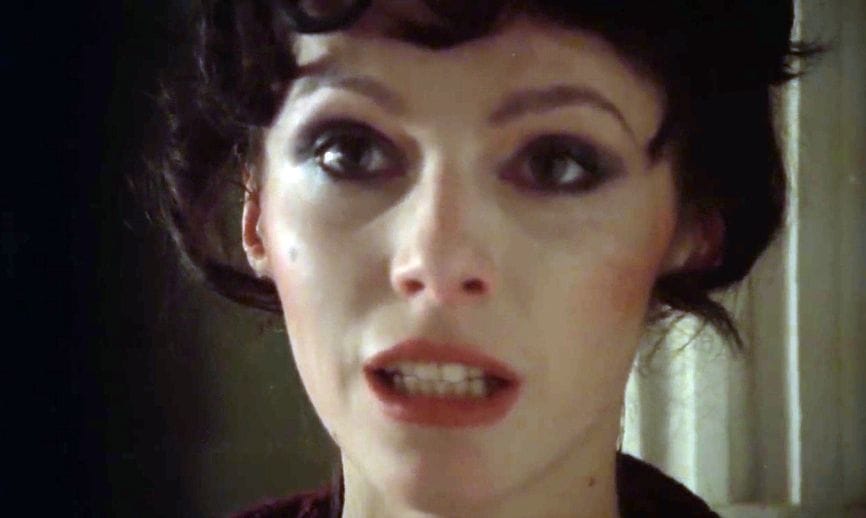
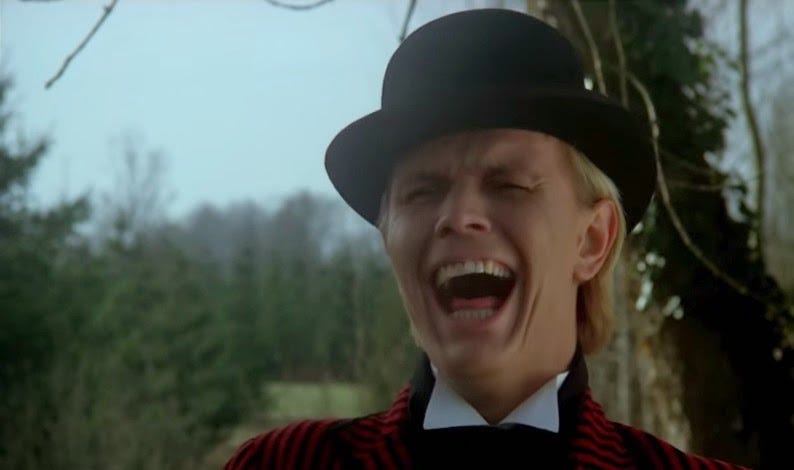
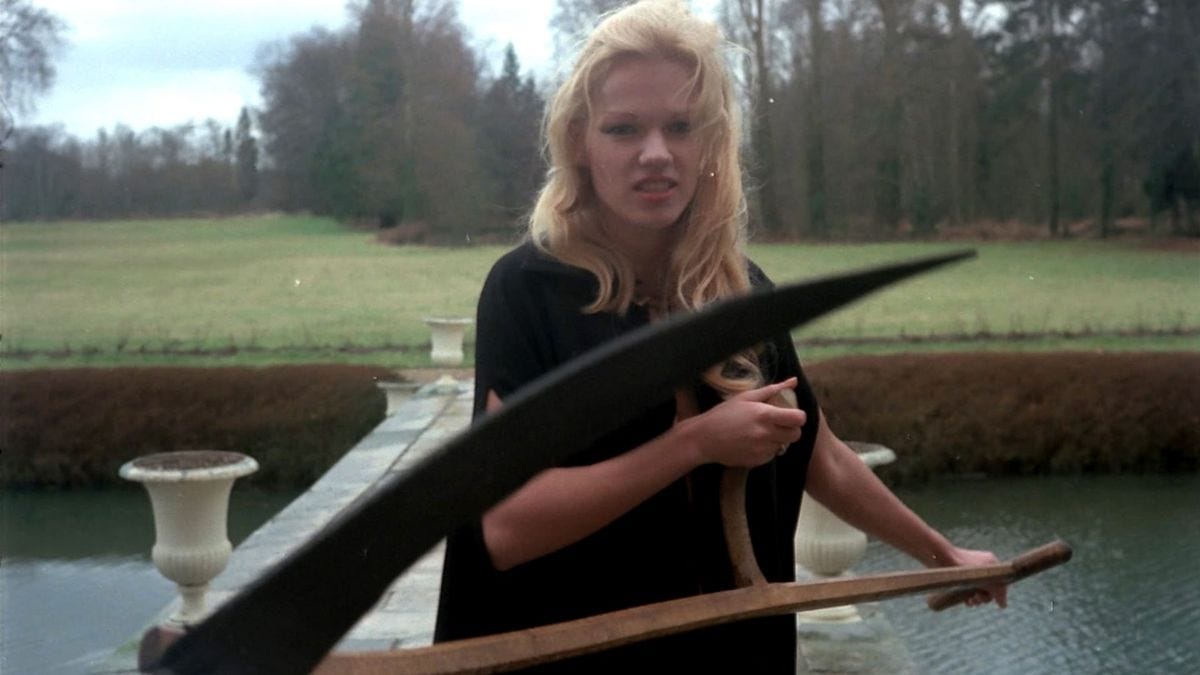
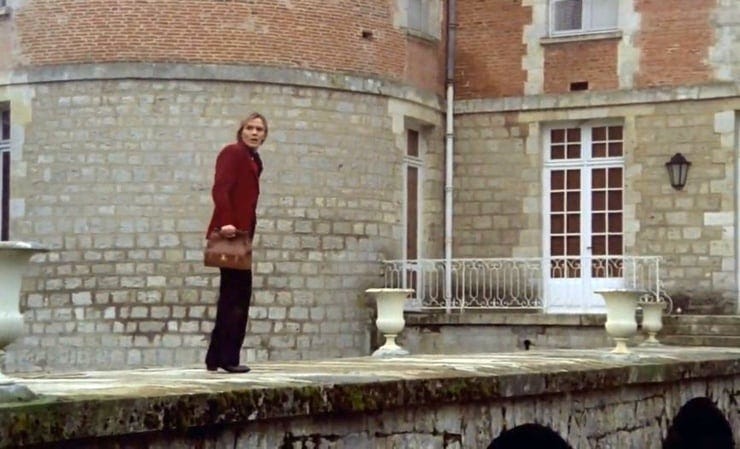
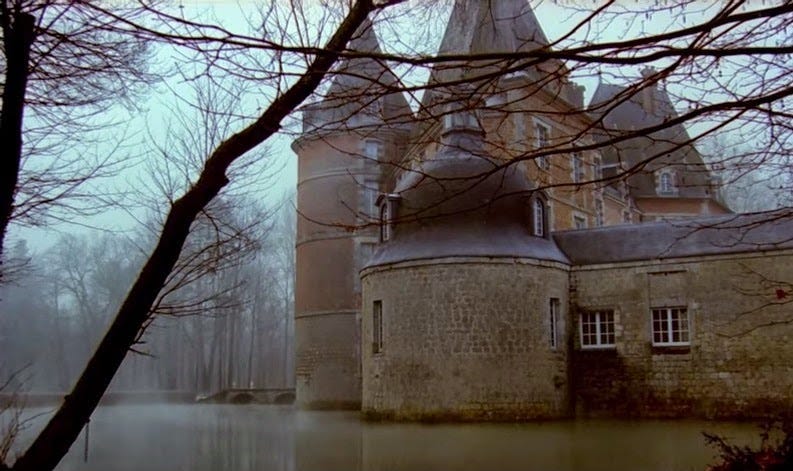
Been meaning to watch Jean Rollin's films for the longest time. The blu-ray cover art never makes it to the HMV cashiers desk for some reason.... lol